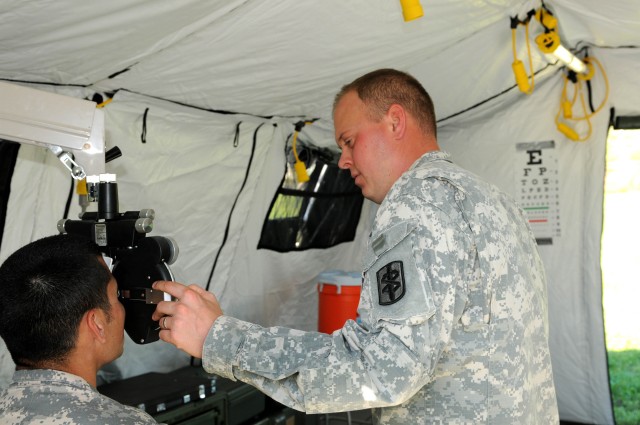
ARLINGTON, Va. (Army News Service, March 22, 2011) -- The U.S. Army, with the support of the Vision Center of Excellence, launched a new Army Traumatic Brain Injury Vision Rehabilitation Initiative in February.
While Traumatic Brain Injury, or TBI, is a significant injury of current military operations in Iraq and Afghanistan, this new initiative is designed to ensure Soldiers with TBI-associated eye problems are diagnosed and referred, if needed, for comprehensive, functional eye examinations and rehabilitative care.
"In addition to headaches or general problems with comprehension, attention, concentration or memory, TBI patients commonly suffer functional vision difficulties including focusing problems, double vision, difficulty reading, sensitivity to light, aching eyes, or loss of visual field," said Maj. Jinjong Chung, who is leading the project for the Rehabilitation and Reintegration Division of the Office of the Army Surgeon General.
After a deployment to Iraq, Chung returned to a position as a TBI staff officer.
"Though I have a pretty well-developed knowledge base in the optometric field, brain injury was a new field for me, as it is for many practitioners," said Chung who also earned a Master's in Health Administration from Army-Baylor University.
Later brought to work in the Army Office of the Surgeon General at R2D to help integrate vision care into TBI care, Chung developed a working group composed of optometrists who were working with TBI patients at larger centers in order to develop a strategic plan to spread to the rest of the Army.
The key component to this initiative, he said, is educating optometrists, patients and rehabilitation providers about different techniques.
"The Army is putting a lot of effort in the care of TBI patients, and the Army optometrist has to be prepared to recognize and manage these patients," Chung said.
In the past, Soldiers diagnosed with TBI have not been routinely examined for functional visual problems at Army Military Treatment Facilities.
"Even facilities that have a robust TBI program may not have systems in place to appropriately follow up with eye examinations or vision rehabilitative care," Chung said.
Under this new initiative, personnel with TBI-related vision problems will have the benefit of a coordinated program of diagnostic services and multidisciplinary rehabilitative care, standardized across the entire Army Medical Department.
The goal is to have a standardized TBI vision exam for all Army personnel with traumatic brain injury and to coordinate the care with other providers.
"Following exam protocols, Army optometrists will diagnose TBI-related vision conditions and then, as appropriate, provide a range of vision correction measures -- from lenses to prisms, and or to initiate a program of vision rehabilitation," Chung said.
Chung and his project working group are helping to strengthen already established rehabilitative programs for patients with TBI-related eye problems at Landstuhl Regional Medical Center and Walter Reed Army Medical Center, as well as in medical centers at Fort Bragg, N.C.; Fort Carson, Colo.; and Fort Campbell, Ky.
"It's great to have these services at larger centers where there is a large staff and specialized providers, but what about the practitioner at a smaller outpost' That practitioner is also seeing TBI-related vision problems and must be able to ensure proper care," Chung said.
Currently, a step-by-step vision rehab toolkit for providers who do not routinely provide functional eye exams is being prepared by Chung and Mitchell Scheiman, a professor and vision researcher at the Pennsylvania College of Optometry.
Ultimately, Chung hopes the Army Vision Rehabilitation Initiative will serve as a model for health-care systems outside the military.
"TBI is not limited to the military population. Health-care practitioners in most settings can expect to see a growing number of patients as TBI awareness grows. TBI-related vision problems must be addressed in these patients.
"That makes standardized, interdisciplinary programs of vision rehabilitation care for patients with TBI an immediate necessity for both the military and civilian sectors," Chung said.
Through the Army's TBI program efforts, Chung said many providers are getting smarter on TBI and working with these patients to take care of their symptoms.
Research, he said, suggests there are real problems such as focusing, eye tracking and eye movement, but it doesn't address the duration of those problems.
Soon, the Defense and Veterans Brain Injury Center will conduct a longitudinal study to follow TBI patients and he said perhaps this study will provide more information on the lasting effects of TBI.
"We continue to streamline our efforts to include identifying best practices, coordinating and standardizing services across the continuum of care to ensure each Soldier gets the right care at the right time," Chung said.
For more information, visit the Psychological Health and Traumatic Brain Injury Center at http://www.dcoe.health.mil/.
Related Links:
Defense Department makes 'great strides' in brain-injury care
Brain injuries: Recovery is possible
STAND-TO!: Traumatic Brain Injury
Defense Centers of Excellence for Psychological Health and Traumatic Brain Injury

Social Sharing